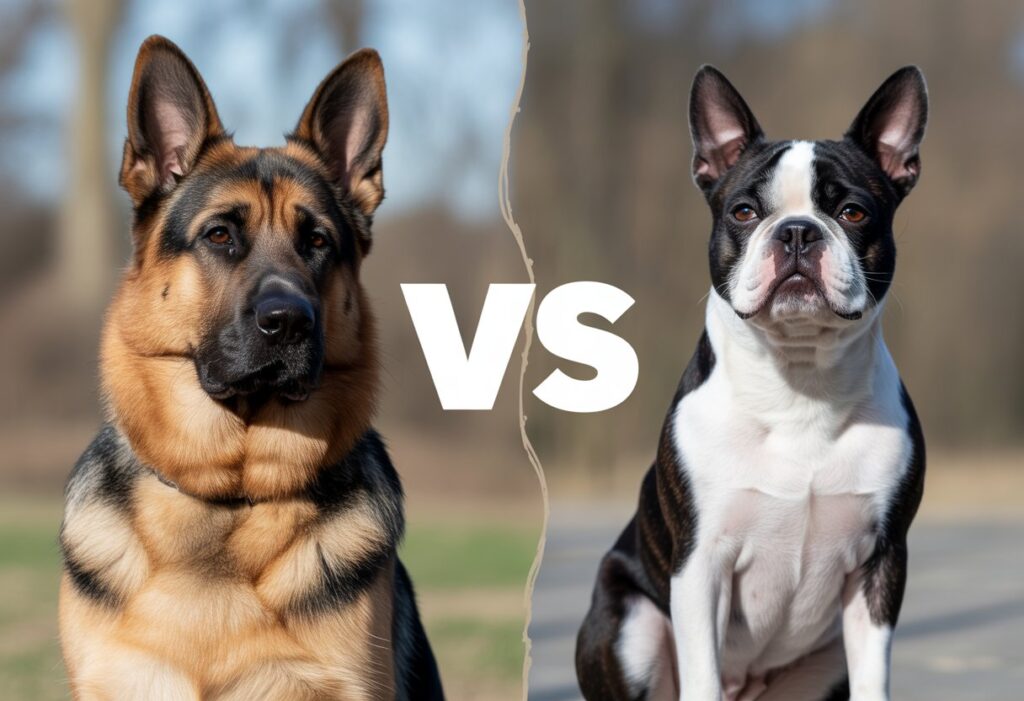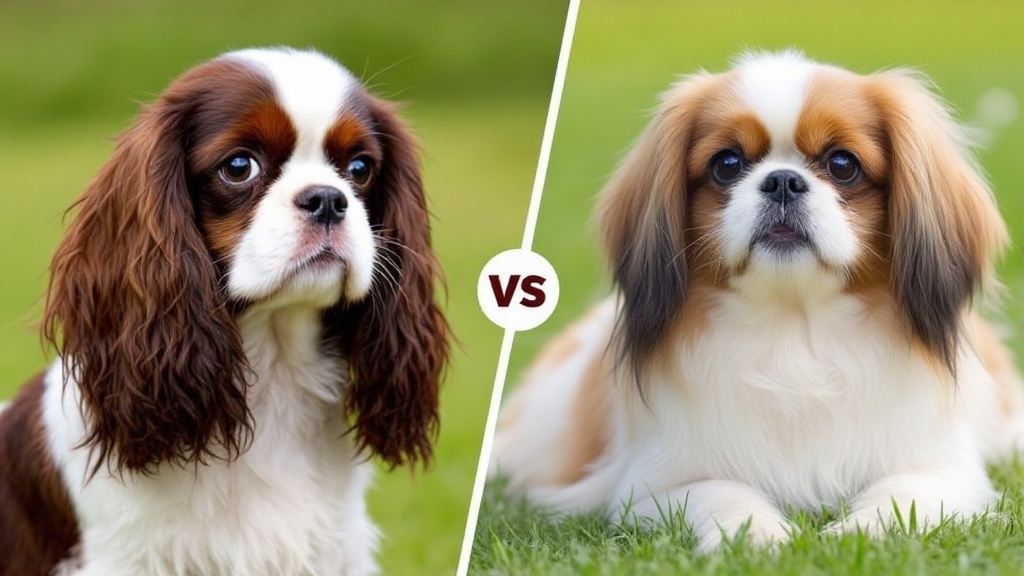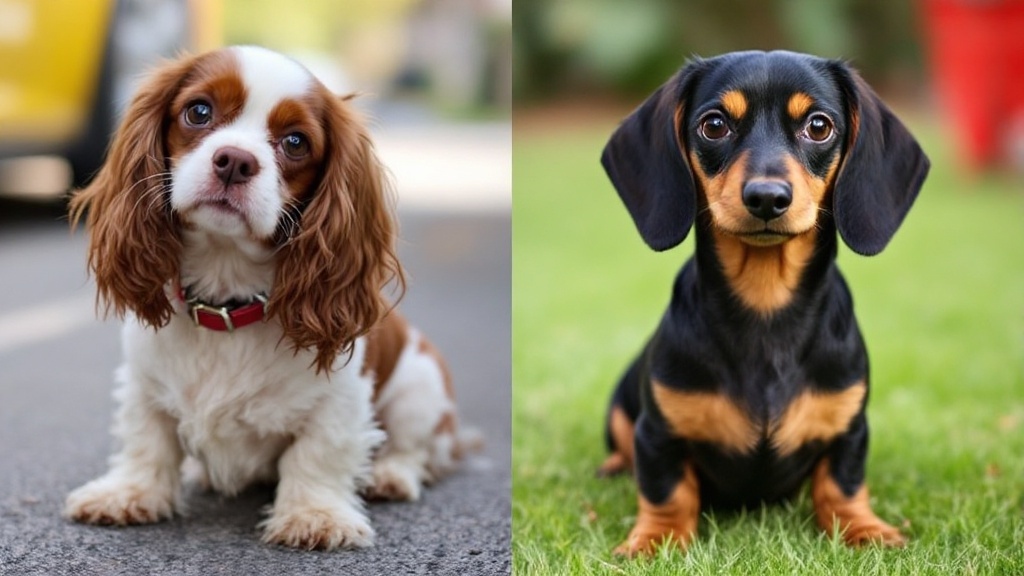German Shepherds and Boston Terriers are both popular dog breeds, but honestly, they couldn’t be more different. If you’re after a big, loyal, and energetic dog, the German Shepherd might be up your alley.
Boston Terriers, though, are smaller, super friendly, and fit right into almost any home. Knowing these differences can really help you figure out which companion matches your lifestyle best.
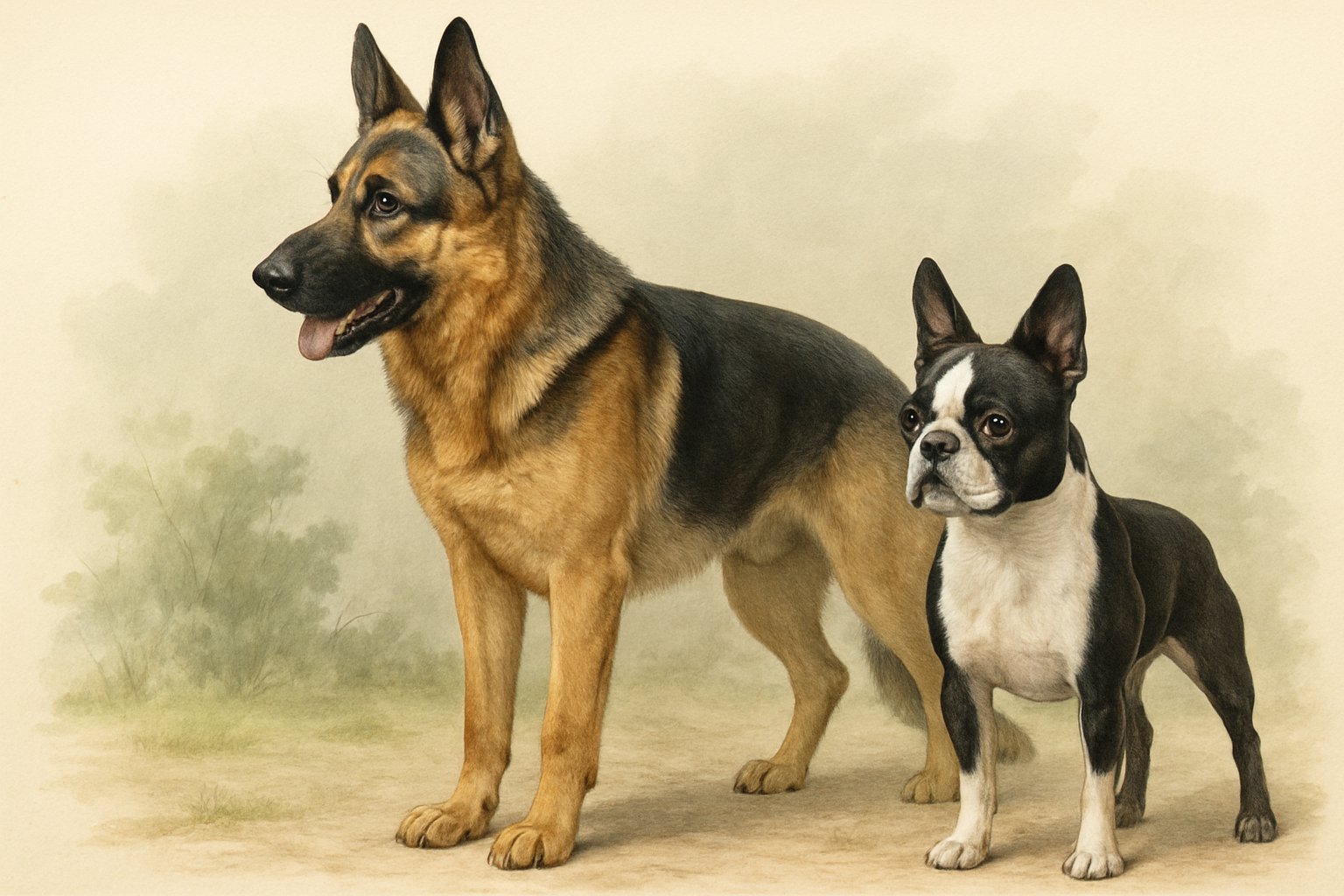
Their looks, personalities, and care needs are worlds apart. Each breed faces its own health quirks and suits different types of owners.
This guide breaks down what makes each one unique, so you can pick the pup that feels right for you.
Key Takeaways
- German Shepherds and Boston Terriers have different backgrounds, sizes, and personalities.
- Their training and exercise needs don’t really line up.
- Picking the right breed depends on your space and your daily routine.
Breed Origins and History
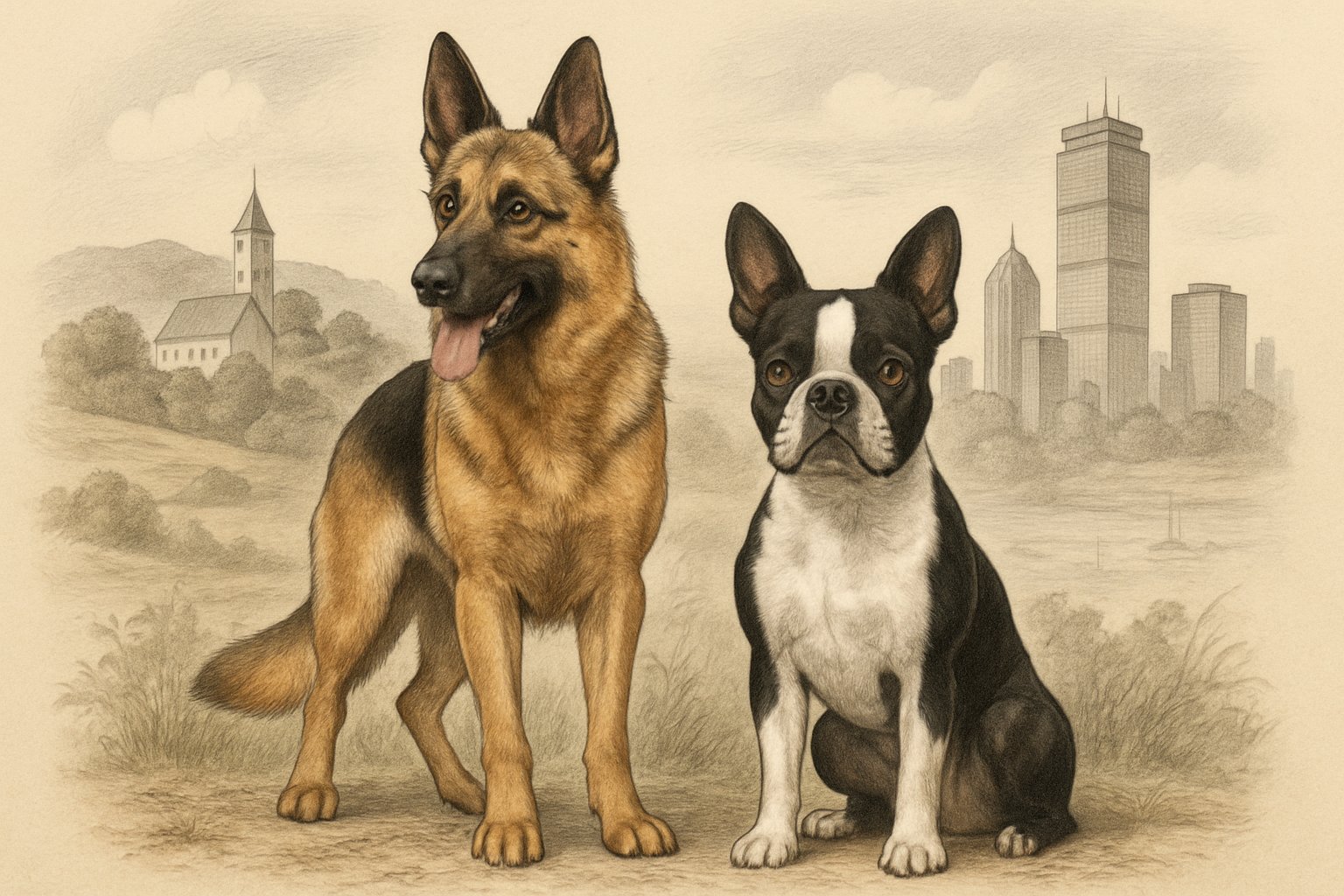
German Shepherds started out as working dogs in Germany. Boston Terriers, on the other hand, were made for companionship in the United States.
Their backgrounds couldn’t be more different, and that shows up in how they look and act.
German Shepherd Origins
The German Shepherd first appeared in the late 1800s in Germany. Max von Stephanitz wanted a smart, loyal, and strong herding dog, so he set out to make one.
Shepherds used these dogs to manage sheep and guard flocks. Police and military groups soon noticed their skills.
By World War I, German Shepherds were working in search and rescue, guarding, and all sorts of service jobs. These dogs still work today, from police and military roles to guiding people with disabilities.
Their long history in tough jobs shaped their drive and sharp minds.
Boston Terrier Development
The Boston Terrier came about in Boston, Massachusetts, also in the late 1800s. Breeders crossed an English Bulldog with a white English Terrier, aiming for a small, friendly city dog.
People quickly fell for Boston Terriers because of their gentle nature and compact size. Folks started calling them “the American Gentleman” thanks to their polite vibe and tuxedo-like markings.
In 1893, the American Kennel Club officially recognized the Boston Terrier. Today, they’re still a top pick for families, especially those living in apartments.
Key Differences in Heritage
The German Shepherd was made for hard work and protection. The Boston Terrier was meant to be easygoing and easy to care for.
German Shepherds have working dog roots—they’re energetic and always on alert. Boston Terriers, meanwhile, were bred as house pets and fit better with people who want a chill, social dog.
These backgrounds really shape how they act, their size, and what roles they play in people’s lives.
Physical Appearance and Size
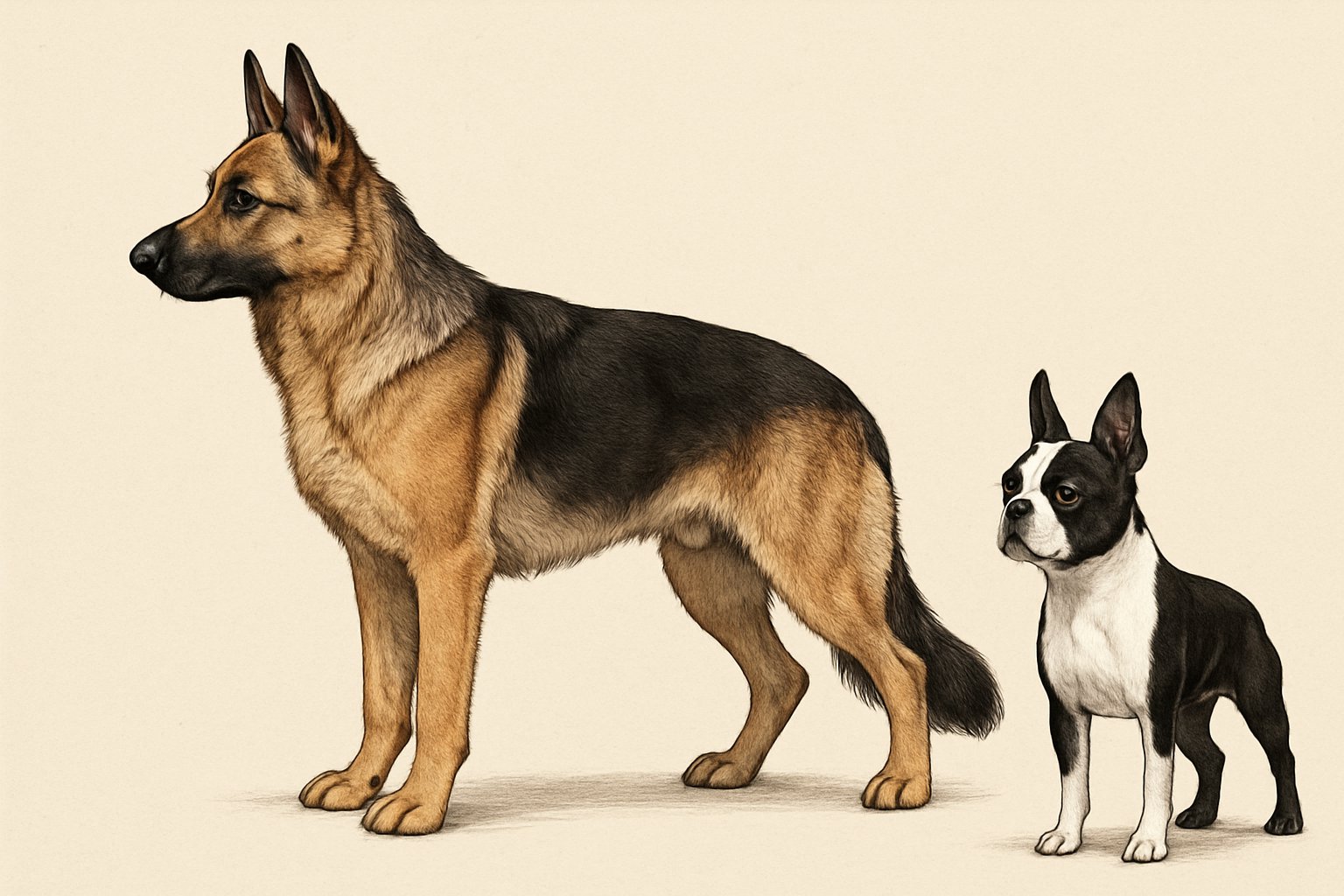
German Shepherds and Boston Terriers look nothing alike. German Shepherds are big and serious-looking, while Boston Terriers are small, sturdy, and have a much friendlier face.
Body Structure and Weight
German Shepherds are large and powerful. Males weigh 65-90 pounds (29-41 kg), and females usually come in at 50-70 pounds (22-32 kg). They stand about 22–26 inches (56–66 cm) tall at the shoulder.
Their bodies are longer than tall, built for hard work, with straight or slightly sloped backs and strong muscles.
Boston Terriers are much smaller. Adults stand 15–17 inches (38–43 cm) tall and weigh 12-25 pounds (5–11 kg). They’re compact, square-shaped, and sturdy, kind of like a mini version of a French Bulldog.
Coat Types and Colors
German Shepherds sport a double coat—the outer layer is straight and dense, the undercoat is soft. This setup lets them handle both heat and cold. Most have black and tan, sable, solid black, or sometimes black and red coats.
Boston Terriers have a short, smooth coat that’s easy to touch and easy to care for. Shedding isn’t much of an issue. Their color patterns are limited: brindle, seal, or black with white markings. They always have a white chest, a band on the muzzle, and a blaze between the eyes.
You won’t see Boston Terriers with the wild color range you get in Bulldogs or Boxers.
Facial Features and Ears
German Shepherds have a long, straight muzzle, black nose, and strong jaws. Their ears are big, pointy, and stand up when they’re grown, giving them that always-alert look.
Their eyes are brown, almond-shaped, and seem to show a lot of smarts.
Boston Terriers have that classic brachycephalic (flat-faced) look. Their heads are wide and square, with big, round eyes set far apart. The nose is short and flat, sort of like a Bulldog’s.
Boston Terriers’ ears stand up too, but they’re rounded at the tips—people sometimes call them “bat ears.” Their faces are sweet and expressive, which makes them stand out from other small breeds.
Temperament and Personality
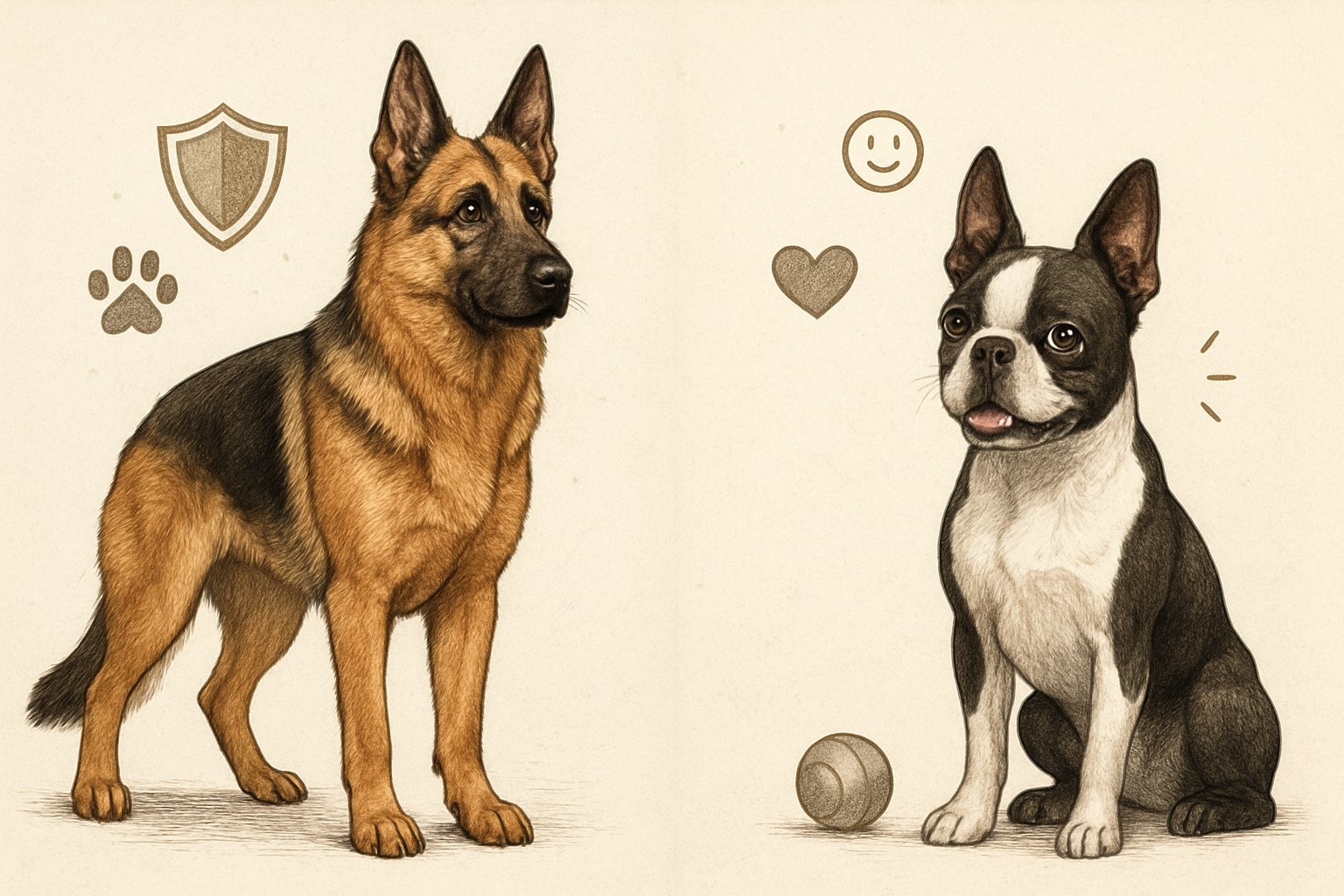
German Shepherds and Boston Terriers have totally different personalities. How they act, how they fit into homes, and how they get along with other animals can be pretty different.
General Behavior Traits
German Shepherds are sharp, loyal, and love to learn. They were bred for work, so they’re happiest with a job or task. Their intelligence is up there with Labradors and Golden Retrievers.
They really need regular training and guidance.
Boston Terriers are friendly, cheerful, and eager to please. They love attention and want to be part of the family.
Compared to German Shepherds or even Beagles, they’re way less intense. Boston Terriers are playful and make great “companion” pets.
Chihuahuas and Yorkies also bond closely with their owners, but German Shepherds are more protective. Boston Terriers? They’re just goofier and usually up for a cuddle or a game.
Suitability for Families
German Shepherds are dependable and protective. They often bond deeply with kids, but their size means you’ll want to socialize them early. Always keep an eye on playtime, especially with little ones.
Boston Terriers are great for families too. Their smaller size and gentle nature mean they’re good with children, and they handle group play well. They’re also more likely to thrive in apartments than a German Shepherd.
Labradors and Goldens are family favorites because they’re easygoing and social. German Shepherds are a bit more watchful, while Boston Terriers are more relaxed.
Interaction with Other Pets
German Shepherds can be wary of new dogs or smaller animals. If you socialize them early, they can get along with cats or other dogs, but their herding or guarding instincts might pop up with unfamiliar pets.
Boston Terriers usually click with other pets. They like group play and aren’t as territorial as Chihuahuas. Still, you’ll want to supervise at first, but most Bostons adjust well if they grow up around other animals.
Beagles do well in homes with lots of pets, and Boston Terriers fit that mold too. German Shepherds might take more time and patience to settle in with other animals.
Trainability and Exercise Needs
German Shepherds are eager learners and need a lot of activity. Boston Terriers, though, prefer a gentler approach and don’t need as much exercise.
Both breeds can be great family dogs, but you’ll want to be ready for totally different routines.
Intelligence and Training
German Shepherds are super smart and pick up on things quickly. They’re often compared to Border Collies and Aussies for problem-solving.
Training them is usually a breeze if you’re consistent and positive.
Boston Terriers are clever too, but they can be stubborn. They do best with short, fun training sessions—treats and lots of praise work wonders. They’re not as intense as Dobermans or Collies, but they’ll happily learn tricks and basic commands.
German Shepherds love having a clear leader and make fast progress with regular training. Boston Terriers need patience, but they’ll get the basics if you keep it light.
Energy Levels
German Shepherds have tons of energy. They need long walks, runs, and plenty of play to stay happy.
Boston Terriers, on the other hand, have moderate energy. A couple of short walks and some indoor or yard play is usually enough. They tire out faster and can overheat, so don’t push them too hard.
If you’re busy or live in a small space, a Boston Terrier is probably easier. German Shepherds are better for active people who like spending time outside.
Suitable Activities
German Shepherds thrive when they have a job. Agility, advanced obedience, and scent work are perfect for them. They also love games like Frisbee, fetch, and even herding—kind of like an Aussie or Border Collie.
Boston Terriers are into gentler games. Try fetch, hide and seek, or short tug-of-war sessions. Puzzle toys are great for keeping their brains busy. Keep things chill, especially if it’s hot out.
Mixing up physical and mental activities keeps both breeds happy. Change up the toys and routines so your dog doesn’t get bored.
Health Considerations
German Shepherds and Boston Terriers face different health issues. Some health problems, like progressive retinal atrophy, hit many breeds, but others are more common in one than the other.
Common Health Issues
German Shepherds often face hip and elbow dysplasia. These problems can cause pain or make it tough for them to walk.
They may also get degenerative myelopathy, which damages the spinal cord. Allergies and bloating (gastric torsion) sometimes show up in this breed too.
Boston Terriers can have breathing problems because of their short noses. Eye issues like cataracts or corneal ulcers pop up pretty often.
Some Boston Terriers deal with patellar luxation, where their kneecap slips out of place. It’s not pleasant to watch.
Other Breeds for Comparison:
- Pug, Shih Tzu, and Cocker Spaniel can struggle with breathing or eye issues.
- Mastiff and Rottweiler often get joint problems like German Shepherds.
- Basset Hound and Great Dane face a higher risk of bloat, just like German Shepherds.
Keep an eye out for these problems. Take your dog to the vet for regular checkups—it’s worth it.
Progressive Retinal Atrophy
Progressive Retinal Atrophy (PRA) is a genetic disease that leads to vision loss. Sometimes it even causes blindness.
Both German Shepherds and Boston Terriers can get PRA, but not every dog will. This condition usually starts with night blindness.
Over time, PRA gets worse, and your dog’s eyes might look cloudy. Other breeds hit by PRA include Maltese, Cavalier King Charles Spaniel, and Cocker Spaniel.
A vet can confirm PRA with an eye exam, though there’s no cure. Responsible breeders run tests for PRA to lower the risk in puppies.
Typical Lifespan
German Shepherds usually live 9 to 13 years. Serious health problems like hip dysplasia, heart issues, or cancer can shorten that.
Regular exercise, a healthy diet, and early treatment help many German Shepherds enjoy life. Still, some things are just out of your hands.
Boston Terriers often reach 11 to 15 years. If they avoid major breathing or eye issues, plenty make it well into their teens.
Routine vet care really helps keep them on track. It’s a bit of luck and a bit of effort.
Other breeds like Bernese Mountain Dog and Great Dane tend to have shorter lives, around 6 to 10 years. That’s mostly because of their size and inherited risks.
The Maltese and Cavalier King Charles Spaniel sometimes make it to their early teens if they stay healthy.
Which Breed is Right for You?
Choosing between a German Shepherd and a Boston Terrier isn’t easy. It depends on your daily routine, home life, and how active you are.
Each breed brings something different to the table. What fits your world?
Lifestyle Compatibility
A German Shepherd needs space to run and lots of exercise. If you’ve got a big yard or love hiking, this breed could be a good match.
They’re loyal, protective, and often work as service or guard dogs. Some families want that extra security or a dog they can train for advanced tasks.
Boston Terriers are smaller and settle in easily, even in apartments. They’re friendly and playful, but don’t need as much exercise as bigger breeds.
Less physical activity is fine for them—about thirty minutes of play or walking each day usually does the trick.
If you’ve got allergies, Boston Terriers shed less and might be easier to live with. German Shepherds, on the other hand, shed a lot, especially when the seasons change. Regular brushing is a must.
Summary of Key Differences
| German Shepherd | Boston Terrier | |
|---|---|---|
| Size | Large (50-90 lbs) | Small (12-25 lbs) |
| Exercise | High, needs activity | Low to medium |
| Shedding | Heavy | Light |
| Trainability | Very trainable | Very trainable |
| Living Space | Needs space, yard | Suits apartments |
German Shepherds fit best with people or families who love staying active. They need plenty of training and exercise, so a big yard really helps.
Boston Terriers? They’re perfect for city life and don’t ask for much in the way of maintenance. You can keep them happy in an apartment, no problem.
Both breeds are loyal and loving, but honestly, they’re pretty different when it comes to what they need day-to-day.

